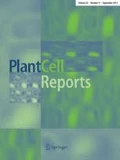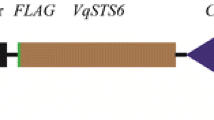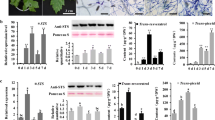Abstract
A stilbene synthase gene was isolated from three Vitis spp. (V. vinifera, V. labrusca and V. riparia). These genes were placed under the control of the cauliflower mosaic virus 35S promoter and introduced into kiwifruit (Actinidia deliciosa) plants by Agrobacterium-mediated gene transfer. The introduced gene(s) were expressed and piceid (resveratrol-glucoside) rather than resveratrol was produced in the leaves of the transformants. Resveratrol produced by the action of the integrated gene(s) seems to be metabolized into piceid by an endogenous glycosyltransferase. Among the transformants obtained, the highest piceid content in the young leaves was 182 μg/g fresh weight. Although these transformants did not show resistance against Botrytis cinerea, which causes gray-mould disease, the fruits may have some beneficial effects on human health.
Similar content being viewed by others
Author information
Authors and Affiliations
Additional information
Received: 2 September 1999 / Revision received: 10 December 1999 / Accepted: 19 December 1999
Rights and permissions
About this article
Cite this article
Kobayashi, S., Ding, C., Nakamura, Y. et al. Kiwifruits (Actinidia deliciosa) transformed with a Vitis stilbene synthase gene produce piceid (resveratrol-glucoside). Plant Cell Reports 19, 904–910 (2000). https://doi.org/10.1007/s002990000203
Issue Date:
DOI: https://doi.org/10.1007/s002990000203




